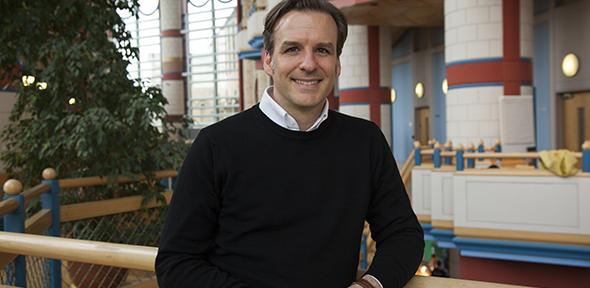
Do emotions matter in the workplace? Jochen Menges, an expert in organisational behaviour, thinks they matter profoundly for employee performance and behaviour.
Emotional intelligence is concerned with individuals, but I was increasingly interested in how collectives come to share emotions.
Jochen Menges
I learnt the importance of putting ideas to the test at primary school in Germany. Our teacher had explained that plants need sunlight to grow. Sensing our scepticism, she brought two tubs of grass and placed one by the window and the other in a cupboard. I was astonished to see that the grass kept in the dark had withered. I’ve kept to the scientific method ever since.
I did my first degree in psychology at the University of Heidelberg. I felt that everything ultimately has to do with people, and that psychology would be a good subject. I worked as a research assistant with Klaus Fiedler from my second semester on and I started with the premise that how we feel emotionally doesn’t impact significantly on our thinking and decision making. In our experiments, we found something very different.
In the 1990s ‘emotional intelligence’ became a buzz phrase. People differ in how they deal with emotions. For some, emotions hinder task accomplishment; for others, emotions help with goal achievement. This idea is at the heart of the concept of ‘emotional intelligence’. Before starting my doctorate, I spent a year at Yale studying under Peter Salovey who, with a colleague, coined the phrase ‘emotional intelligence’. Suddenly, everyone was talking about the importance of emotions.
‘Collective emotions’ was the subject of my PhD. Emotional intelligence is concerned with individuals, but I was increasingly interested in how collectives come to share emotions. I did my doctorate at the University of St Gallen in Switzerland, setting out to examine the human factors behind the very different climates that exist in the workplace.
My research revealed that workplaces have distinctive moods. I carried out a study of some 20,000 employees in more than 100 organisations. What I found was that leaders shape the emotional climate of organisations. Some companies have an atmosphere of dynamism, others a mood of defeat. The people at the top often wonder why this is — without realising how powerfully their own emotional state filters down.
In 2008 Barack Obama gave a speech in Berlin. He was considered a highly charismatic leader able to stir the emotions of a crowd. I went to hear him along with 200,000 other people. He spoke movingly about the challenges facing the world. The crowd was quiet. Obama had touched their hearts, and yet the intense emotions people were feeling were not evident on their faces. This seeming contradiction led me to articulate a new theory of how charismatic leadership works.
I introduced the term ‘awestruck effect’ to describe the workings of charisma. When charismatic leaders leave us awestruck, we’re overwhelmed by emotion but unable to express it. This has positive and negative effects. On one hand, people feel inspired and ready to change their behaviour in support of the leader. On the other, people invest mental energy into dealing with their emotions and have less energy to devote to their critical faculties. Their cognitive abilities are clouded.
My research at Judge Business School revealed the negative effects of charisma. In 2009 I joined JBS as a University Lecturer in Organisational Behaviour. We ran an experiment on the awestruck effect, in which the same speech was given two different ways. The first time, the speaker delivered his script with passion. The second time he gave it in a regular style. We discovered that the regular speech was more memorable. If people are mesmerised, they seem to lose the capacity to question.
The ‘awestruck effect’ may be at play at Cambridge, too. When I began working here, the marvellous buildings and the history of the place put me in awe. I accepted the way things are done and adjusted my behaviour with the result that I thrived as a researcher. I think this transformative power is one of Cambridge’s greatest assets.
Cambridge’s transformative power is felt by new arrivals. Each new generation of students and researchers carry forward the ancient traditions that have made the university so successful. One day I hope to study whether the extent to which new students are awestruck as they arrive on campus predicts the extent to which they adjust their behaviour and internalise the Cambridge way.
My research is located at the intersection of leadership and emotions. Today, I continue to focus on how workplaces differ in regards to the emotions that people share. I’m contributing to a study called Emotion Revolution in the Workplace by the Yale Center for Emotional Intelligence and the Faas Foundation. This study aims to understand how people feel at work and how they wish to feel — and how we can close the gap between the two.
Leaders often want to become more emotionally literate. The business people I teach often want to change the prevailing emotions in their workplace. I expose them to the concept of emotional intelligence and explain how the best leaders use it to achieve goals by touching the hearts of their followers. Because we unfortunately receive so little instruction on emotions at school and university, there’s plenty of room for improvement.
Jochen Menges works for both Judge Business School Cambridge and WHU — Otto Beisheim School of Management in Dusseldorf.
This profile is part of our This Cambridge Life series.
